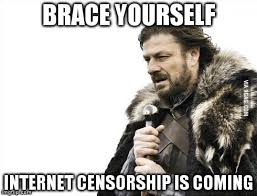An Interview on Why Section 230 Is On the “Endangered Watch List”
[I did a short interview with a book author:]
 When we hear this debate of whether social media sites are publishers or platforms, why is it relevant to everyday consumers of content from sites like Facebook and YouTube?
When we hear this debate of whether social media sites are publishers or platforms, why is it relevant to everyday consumers of content from sites like Facebook and YouTube?
It isn’t, really. Section 230 says that Facebook, YouTube, and other social media services have the same legal protection whether they function as a publisher of third-party content or as a platform for that content. This legal principle is why we as consumers are able to enjoy social media at all. Without Section 230, at minimum, social media services would need to pre-review all user submissions for legal risk–a process that would eliminate the immediacy of conversations on social media. More likely, social media services would only provide publication tools to a small subset of content producers; or most likely, they would simply cease to exist.
Is there a strong likelihood that Section 230 of the Communications Decency Act will be edited or re-visited anytime soon?
Section 230 is on the endangered watch list. Government regulators have decided that they must “fix” the Internet, and their efforts to fix the Internet will certainly include revisions to Section 230. Unfortunately, most government regulators view the Internet only as a threat, and they are prepared to sacrifice everything we love about the Internet in a quest–most likely futile–to eliminate the perceived threats. There is a massive disconnect, then, between most consumers who love the Internet and value it highly in their lives, and government regulators who are working hard–and against their constituents’ interests–to take all of that away.
What are the implications to consumers if it is edited (sites categorized as publishers and/or held more responsible for content on their sites)?
When Congress is done “fixing” Section 230, we will see the end of the user-generated content era of the Internet (what has often been called Web 2.0). In its place, we will see the emergence of Web 3.0, which will be principally professionally produced content made available behind paywalls (where the paywall fees will be used in part to compensate the professional content producers). In other words, Web 3.0 will look a lot like how the cable industry looked in the 1990s, or how Netflix looks today. I love Netflix, but it’s not the Internet–but Netflix-style services will be all we have left to enjoy on the Internet, and only after we pay a greater amount of our income to gain access.
How can the average consumer participate in this debate? Is there something they should do to protect themselves or have their voices heard regarding the subject?
Because there’s such a large disconnect between politicians and the constituents they represent, there is actually a lot of room for individual citizens to make a difference. Find out if your elected officials are working on Internet policy or supporting other politicians’ work. If so, find out if they are supporting regulations that would damage the Internet; and ask them for empirical evidence demonstrating that their efforts will solve the purported problems and not cause unwanted collateral damage. Simply letting your politicians know that you care about the Internet and want them to fight for an open Internet will go a long way. Simply put, they never hear that message from their constituents, and they assume their constituents want them to burn down the current Internet. Tell them they are wrong.

Pingback: News of the Week; September 16, 2020 – Communications Law at Allard Hall()